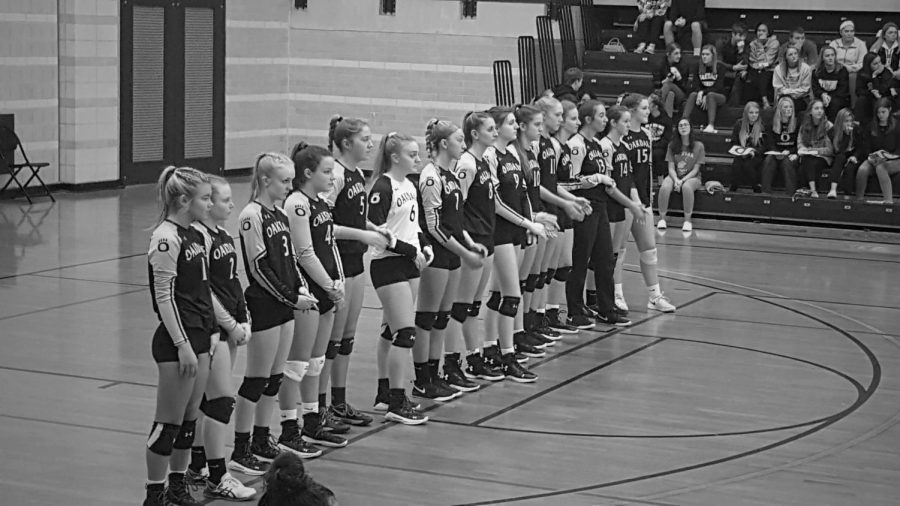Are High School Sports Contributing to Teens’ Mental Health Epidemic?
The volleyball team contemplated the state finals game they faced, moments before it began.
December 10, 2019
As the years pass, mental health is becoming more and more of an issue, especially for teenagers. More high school students are using anti-anxiety medications and dealing with depression than ever before (Wood, Bryant/National Federation of High School Athletes). Some say the cause could be sleep deprivation, social media, pressure of school or sports. But could sports actually be helpful for students’ mental health?
Many studies suggest that sport and competition improve mental state. For example, Newport Academy, a teen mental health center, found that, “playing school sports during adolescent years is significantly linked to lower depression symptoms, lower perceived stress, and better self-rated mental health in young adulthood,” (Teens).
One source mentions that, “Athletics may also represent an avenue of ‘escape’ for students,” which is one of the many reasons that I play my sport (Wood, Bryant/National Federation of High School Athletes). In my opinion, sports give students a platform to learn to work hard, concentrate, collaborate, and to lead.
As many coaches for several different sports have told me in one form or another, ninety percent of the game is mental. This holds true in volleyball, cross country, trap shooting, swimming, and golf; the list goes on and on.
Due to the mental game of each sport, many athletes get severe anxiety about their potential performance, which can carry over to everyday life, especially when the stakes are high, and an athlete doesn’t perform as well as expected. Even Olympian, Michael Phelps, admitted that he had considered suicide at one point (Peirce, Nick, et al/Faculty of Sport and Exercise Medicine UK).
In some cases, severe mental health can affect physical health. This is substantiated in the fact that many athletes vomit before matches, due to having anxiety of the outcome. In fact, some professional athletes even get sick to their stomachs before every game.
This goes to include NBA All-star, Bill Russell, who wouldn’t walk out onto the court until throwing up. It was a regular routine for him, but could be, “a symptom of you being ‘in the red zone’ as far as your level of physiological arousal goes,” according to Dr. Goldberg, a specialist in peak sports performance.
Social and societal expectations take a toll on athletes. One anonymous student claims, “I am scared to perform in front of my family members. It puts too much pressure on me,” emphasizing the fact that high school sports can be too much to handle. The same student also included that being on a team sport can add to the pressure, because, “your team is counting on you.”
Even Rob Gronkowski, a retired NFL tight end for the New England Patriots, decided to take a step back from football to mentally recover. He claims, “I just knew I had to get away from the game of football and start working on my mental well-being, for sure,” (Mhatre, Amol/CBS).
Not only does a sport in itself put a strain on students, but the responsibility of school work, familial obligations, and taking care of oneself put an extra toll on students. Sophomore Nic Moyer comments, “I need to get A’s, I need to excel in my sport, I need to take care of myself, and I’d like to leave time for my friends and family, but ultimately, it’s not all going to happen.”
Moyers comment elucidates the importance of time management, which many student-athletes struggle with, but can also lead to a positive outcome, as time management becomes more of a critical skill in the real world.
If an athlete is truly struggling with mental health, I recommend taking a step down competitively, and play more for leisure. Coaches can also help in this respect, giving more positive feedback to athletes instead of common harsh criticism.
Mental health is something to be aware of, but not something to limit students from doing what they love. Although I feel pressure for my sport, I love it too much to give it up, and I think that if other students feel the same way, they should continue to push themselves and learn to balance responsibilities, because in the end, it’s worth the struggle to become a champion.





























